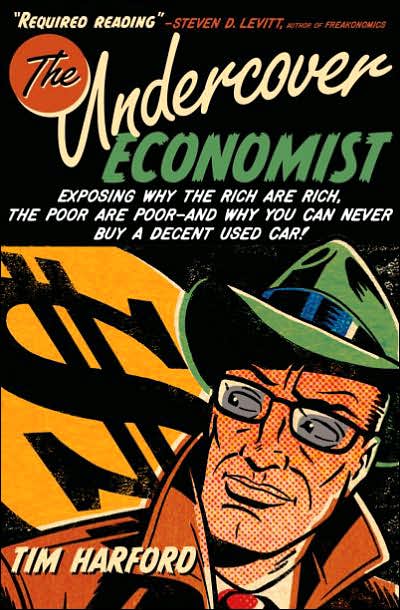The latest book I want to bring your attention to is ‘The Undercover Economist’ by Tim Harford.

I was attracted to the book because I read a similar one last year called ‘Freakonomics’ which grabbed my attention with it’s snazzy cover and interesting topics of discussion. I picked up The Undercover Economist hoping for more of the same.

Freakonomics is a hard act to follow; authors Steven D. Levitt and Stephen J. Dubner dug in deep, their project included chapters such as:
- What Do Schoolteachers and Sumo Wrestlers Have in Common?
- Why Do Drug Dealers Still Live with Their Moms?
- Where Have All The Criminals Gone?
Sounds fun right? It was. Not only did they ‘have a laugh’ with Freakonomics, they also broke down a lot of theory and indirectly showed readers how to apply it.
The Undercover Economist is as interesting, but not as fun. Harford seems a lot more rigid and practical. A lot of his arguments and theories are sensible, logical and pretty much air tight. He covers each subject from a variety of angles and indirectly gives you the tools you need to go out there and start challenging your own world of microeconomics. Great stuff . . . if you can be bothered that is.
You’ll learn some economical jargon along the way and start paying more attention to your pennies. You’ll begin to notice a lot of the options society makes indirectly available, and you’ll know why people complain about things they have power over.
Tim Harford’s effort is original in the sense that it not only explores economical loop holes and faults, but also offers solutions as to how economics can make the world a better place for everyone . . . sounds like something an eight years old girl would waste a wish on if she found a magic lamp. His solutions to everyday problems however are well thought out, realistic, and also feasible. Keep reading his book and you’ll also know why they are not implemented.
Economics is not as simple as ‘supply and demand’. Economics tells us who gets what, and more importantly why they get it.
Want to know why we pay so much for confectionaries when we go to the cinema? Might not seem so important because we can evidently ‘afford’ to be overcharged . . . so why is it that we (London citizens) complain continuously about outlandish public transport prices?
I’d argue that we are all to an extent Undercover Economists because we have reasoning and understanding where our finances are concerned. We can tell you why we chose one product over another, our definitions of a bargain and we know when we are being ripped off.
Tim delves a lot deeper, at times you’ll be pointing the accusing finger at yourself, but be reassured, you’ll get to wave it at others as well.
A to the . . .
- What Do Schoolteachers and Sumo Wrestlers Have in Common?
- Why Do Drug Dealers Still Live with Their Moms?
- Where Have All The Criminals Gone?
Sounds fun right? It was. Not only did they ‘have a laugh’ with Freakonomics, they also broke down a lot of theory and indirectly showed readers how to apply it.
The Undercover Economist is as interesting, but not as fun. Harford seems a lot more rigid and practical. A lot of his arguments and theories are sensible, logical and pretty much air tight. He covers each subject from a variety of angles and indirectly gives you the tools you need to go out there and start challenging your own world of microeconomics. Great stuff . . . if you can be bothered that is.
You’ll learn some economical jargon along the way and start paying more attention to your pennies. You’ll begin to notice a lot of the options society makes indirectly available, and you’ll know why people complain about things they have power over.
Tim Harford’s effort is original in the sense that it not only explores economical loop holes and faults, but also offers solutions as to how economics can make the world a better place for everyone . . . sounds like something an eight years old girl would waste a wish on if she found a magic lamp. His solutions to everyday problems however are well thought out, realistic, and also feasible. Keep reading his book and you’ll also know why they are not implemented.
Economics is not as simple as ‘supply and demand’. Economics tells us who gets what, and more importantly why they get it.
Want to know why we pay so much for confectionaries when we go to the cinema? Might not seem so important because we can evidently ‘afford’ to be overcharged . . . so why is it that we (London citizens) complain continuously about outlandish public transport prices?
I’d argue that we are all to an extent Undercover Economists because we have reasoning and understanding where our finances are concerned. We can tell you why we chose one product over another, our definitions of a bargain and we know when we are being ripped off.
Tim delves a lot deeper, at times you’ll be pointing the accusing finger at yourself, but be reassured, you’ll get to wave it at others as well.
A to the . . .








